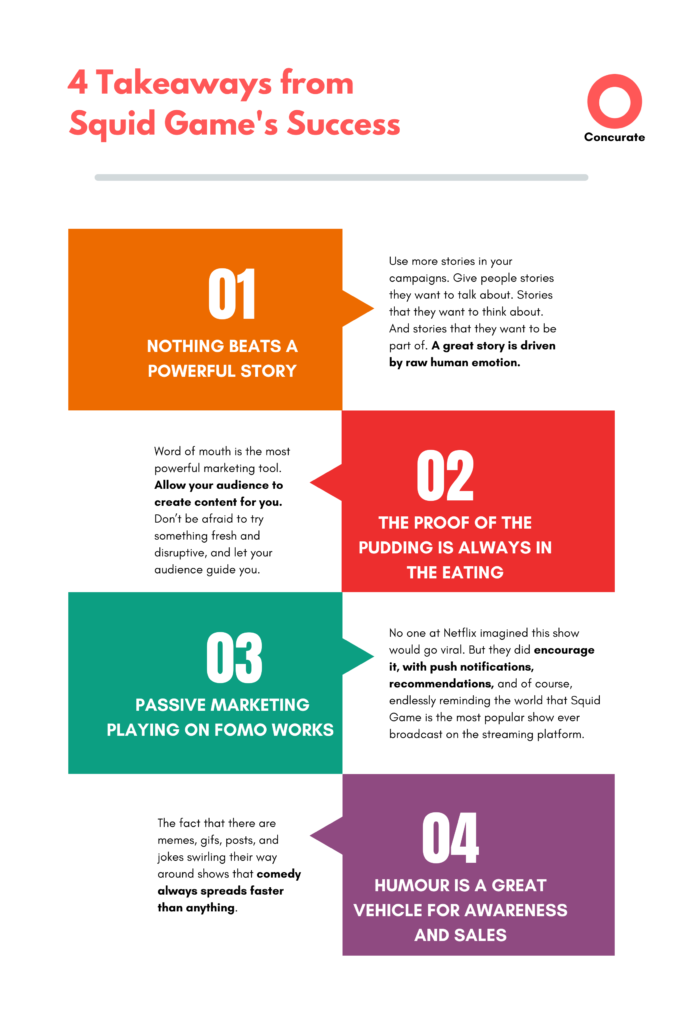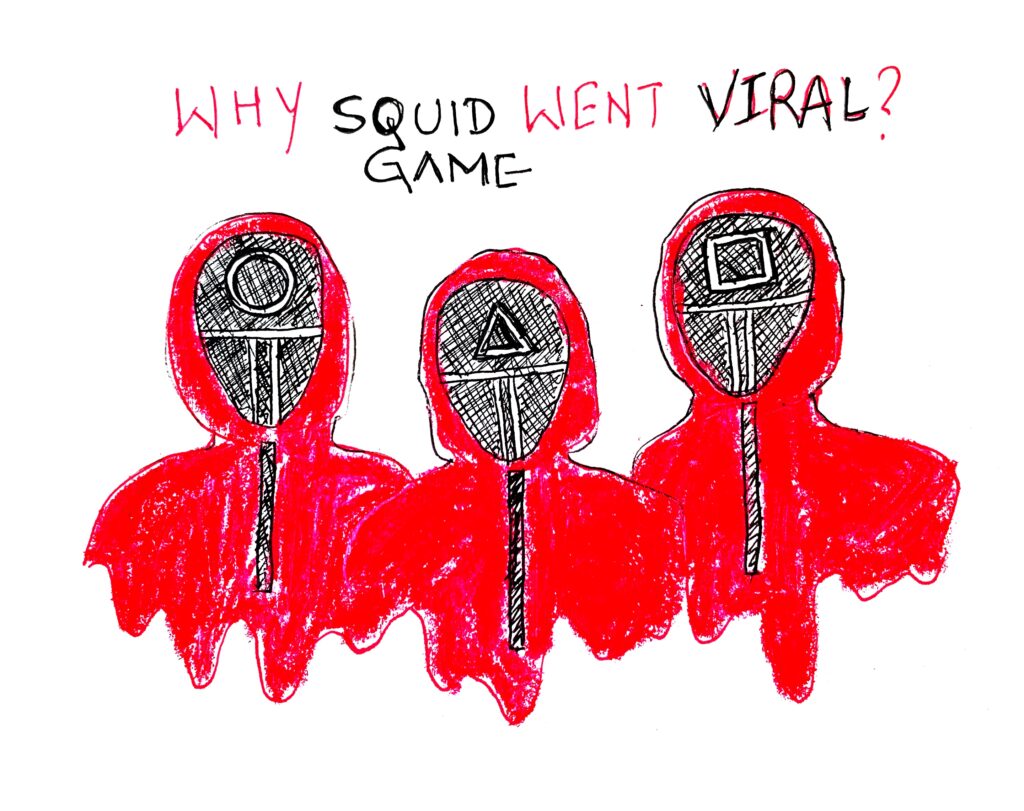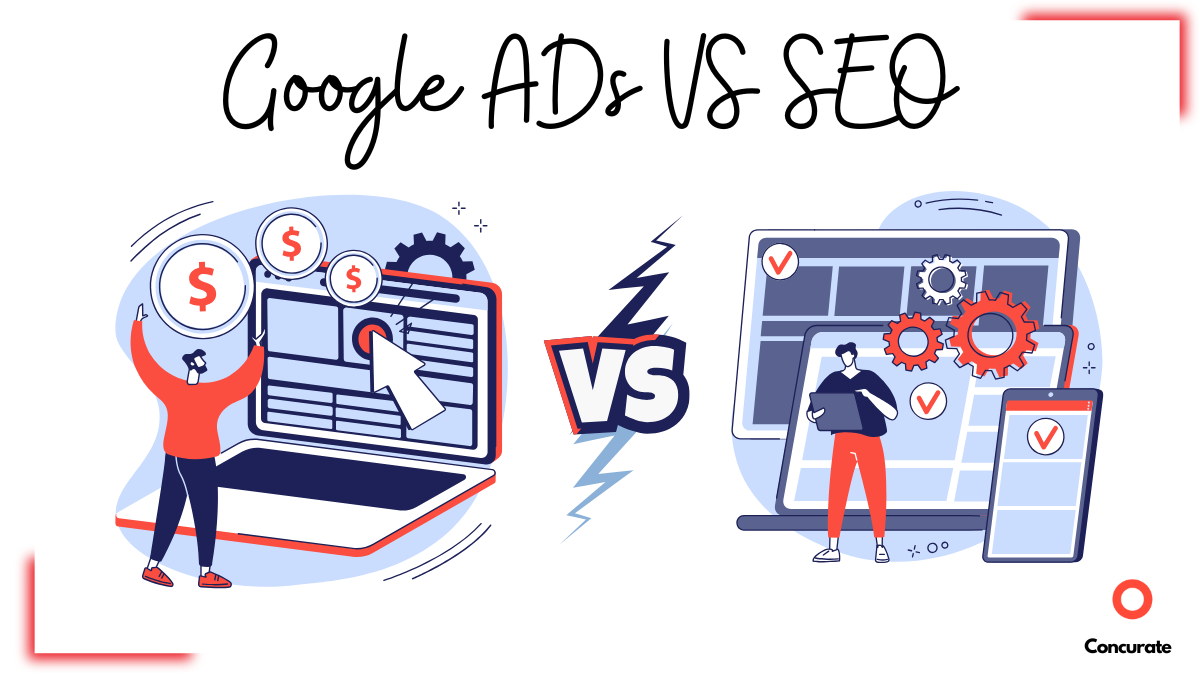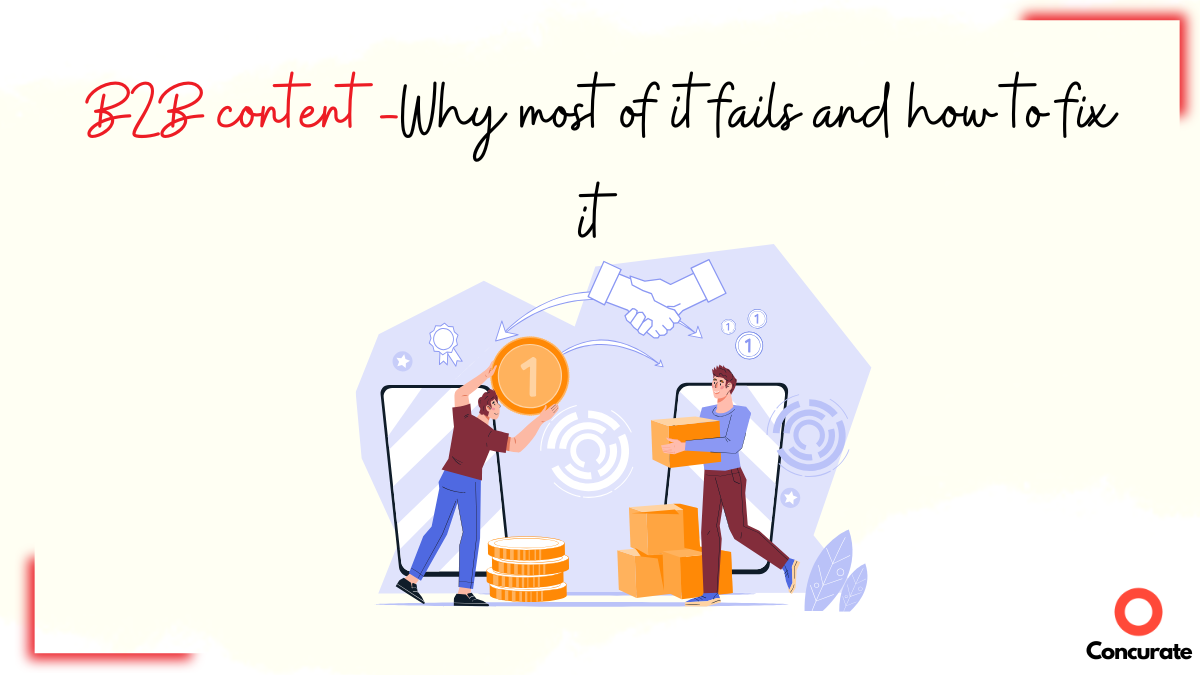10 years of thought. 6 childhood games. 1 dystopian satire. 1.56 billion hours of viewing. $900 million in impact value. A global phenomenon. A Myth Buster.
Myth Buster
Squid Game has busted some myths that over time we had begun to believe to be the gospel truth:
- Attention spans have drastically reduced. People prefer consuming shorter content.
- Everyone loves comfort TV. Dark, violent content doesn’t do well.
- Simplicity doesn’t work anymore. A script needs to shock and awe.
“Win or Die.” This simple formula was what the show rested on, and if you think about it, so do our lives.
10 years ago, this script was rejected for being grotesque and an unreliable battle royale. Today, it has been watched by 142 million households since its September 17 debut and helped Netflix add 4.38 million subscribers.
Many credit the timing of its release. COVID-19, uncertainty, and the realization of the frivolity of life. However, the strongest factor that propelled the show to THIS level of virality, in my opinion, is simple.
It portrays an exaggerated yet apt reality: the rat race we get caught up in, letting the little joys of life slip by in a hopeless quest for money, and then some more.
Like the games the 456 men and women are embroiled in on the show, Squid Game’s virality can be attributed to simplicity and a little bit of luck.
But nothing can take away from how much word-of-mouth, content marketing, and Netflix’s promotion strategy helped propel it to the next level.
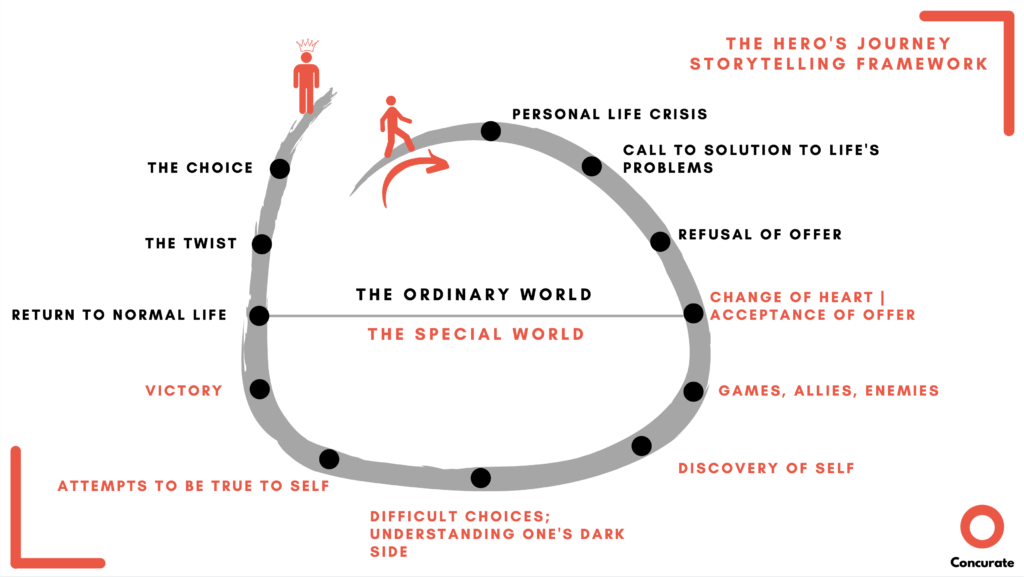
Storytelling Framework – The Hero’s Journey
5 Reasons Why Squid Game Went Viral
Suspense. Simplicity. Relatability
“It’s a sad story. But the reason why I returned to the project is because the world 10 years from then has transformed to a place where these unbelievable survival stories are so fitting, and I found that this is the time when people will call these stories intriguing and relatable.” – Director Hwang Dong-hyuk
Squid Game is the KISS principle – Keep It Simple, Stupid – in action. Everything about it, from its storyline to its sets, costumes, and camera work, is simple. Keeping it simple has helped the show be more relatable and easier to comprehend.
While the premise is based on a tried-and-tested survival thriller formula built around games, the show has its share of unexpected twists. But largely, it rests on a simple foundation.
Minyoung Kim, the VP for Content in Asia at Netflix, believed that the simplicity of the show and the childhood games kept the barrier to entry very low. Anyone who grew up playing these games could instantly connect with and appreciate them.
Squid Game’s success follows the classic Hero’s Journey, much like Breaking Bad, which also mastered the art of escalating stakes and emotional payoffs. Here’s how Breaking Bad leveraged storytelling for virality.
Financial Debt and Squid Game’s Reality
The show is deeply rooted in truth. Financial debt in South Korea has been overwhelming.
In 2021, the total amount of debt exceeded the country’s GDP by 5%. Financial stress has long plagued South Korea, and this is something Hwang Dong-hyuk, who was struggling with debt and loans when he wrote the script, could relate to.
Brian Hu, a film professor at San Diego State University in the United States, said, “The unique thing about ‘Parasite’ and ‘Squid Game’ is that while the works depict poverty and class inequality, they do so in a way that exerts Korea’s technical and cinematic modernity.”
Netflix’s Release and Promotion Strategy
Source: Twitter
Netflix now works with Ernst and Young to create “Most Popular” lists based on the total number of hours watched. Curating these lists has helped propel certain content to intense popularity. Netflix was quick to pick up on Squid Game’s popularity and list it in all of its curated lists.
Netflix was sure that the show would be a hit in South Korea. What surprised them was how well it did in the rest of the world. Despite having no marketing strategy for the rest of the world, except a generic trailer for the US, Netflix didn’t really advertise Squid Game.
What Netflix did do, though, was dub it extensively. The English dub was widely praised, and many non-Korean speakers, including myself, preferred it. The availability of a dub made the show more accessible and contributed to its high viewership rates and popularity.
While Squid Game reached meteoric success through organic marketing, Netflix worked behind the scenes to reinforce the show in subscribers’ minds. By closely monitoring traffic and curating lists based on popularity, Netflix ensured that Squid Game always appeared in the Top 10 across geographies.
Pro tip: If you need 30 standout SaaS growth hacks to attain double the growth for your SaaS business, fill out the form below!
The Show Itself
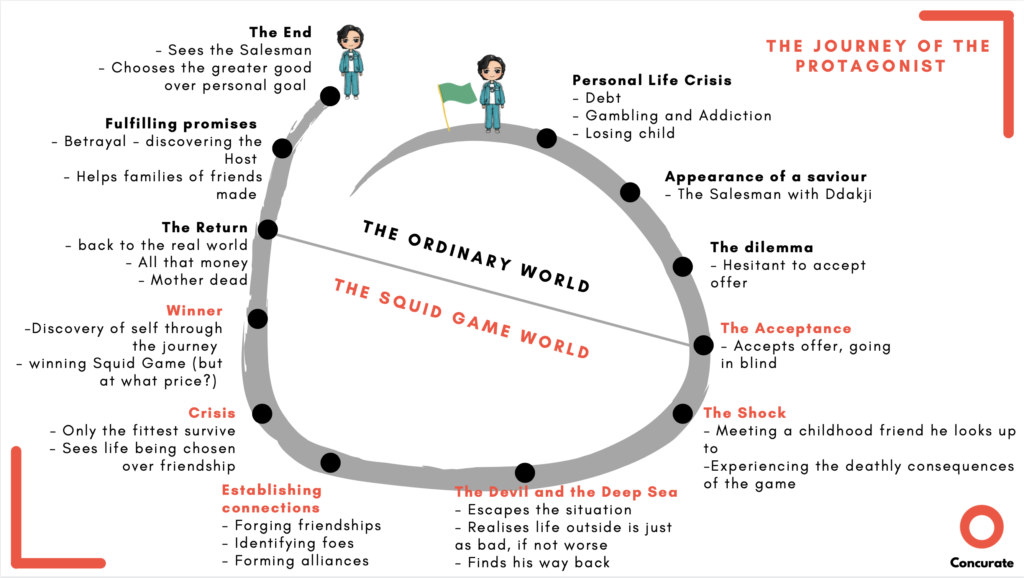
Why Squid Game Went Viral: Hero’s Journey Framework
Squid Game speaks to the very root of humanity. The law of the jungle is the only law that applies, and only the fittest survive.
Fiction helps one escape reality, but how much better was the fiction that Squid Game created?
A life of debt outside the jungle had no brighter prospects either. This resonated with viewers, 1.54 billion hours of viewing in the first four weeks is proof enough that primal survival instinct wins.
Sets, Costumes and Art Direction
Everything visual about Squid Game has great recall value, from the costumes to the set and, of course, all the deaths. The use of color was especially thoughtful.
The contrast between the bright red of the guards’ uniforms and the green worn by the players stood out. The candy-colored staircase evoked an illusion of happy uncertainty, mimicking the deadly consequences of losing a children’s game.
I have to tip my hat to the Art Director who has managed to use the sets as a canvas to showcase the conflict and contradictions through his vision. The value that that has added to the show is immeasurable.
Music and Sound
The background music, choice of song and sound engineering that must be applauded helped make the show an experience. The juxtaposition of a happy Irish tune in Blue Danube that signalled a dreadful death as the call to each game is a wonderful reinforcement of the dystopian satire that is Squid Game.
Human Psychology
On the merits of the show itself, Squid Game reaches out to us on a primal level. The flawed characters force us to put ourselves in their shoes. Their less than perfect portrayals, the shades of grey that are brought out make them believable, relatable.
Whether it’s the contestants (whose pain and despondency is easy to echo) or the VIPs who are watching the game (which role is what we as viewers play too, if you think about it), the perspective we as viewers have is dual. At some level, that reminds us that we are flawed too.
Playing on raw emotion, again. As real as it all feels, it still feels distant though. For non-Korean viewers, there is a distance created that makes this piece of believable fiction more easily digestible.
Simply because though we relate to the characters on a primal level, it doesn’t seem real enough because they speak a different language. So while there is a sense of relatability and attachment, there is a sense of detachment and a safe space where we know we are merely observers.
Social Information and FOMO
Squid Game became a water-cooler show. The social validation it got spread like wildfire. FOMO (fear of missing out) helped propel its popularity.
As conversations around the show circulated in social circles, it became a status symbol, and people felt left out if they weren’t watching it.
Marketing | Before, During, After
Squid Game is now much bigger than Netflix.
Netflix relied on the oldest trick in the marketing book, word of mouth. Content’s ability to generate conversation is what helped Squid Game go viral.
With social media being as powerful as it is today, FOMO became a key driver of the show’s popularity.
“People hear about it, people talk about it, people love it, and there’s a very social aspect to that, which does help grow the show outside of what we do,” Netflix’s global TV head, Bela Bajaria
Netflix’s organic marketing for Squid Game mirrors how brands like Gymshark leveraged community-driven growth to scale rapidly.
Twitter Engagement
With its impeccable data analysis, Netflix was quick to pick up on the popularity Squid Game generated by tracking its appearance on social media. They were quick to ride that wave, and began making their presence felt through memes of their own in a move to promote the show.
Source: Twitter
Source: Twitter
Bringing Squid Game to life
Netflix on Halloween set up RedLight, Green Light in KoreaTown in Los Angeles to bring Squid Game to the people as a “Halloween Surprise”.
The Korea Pavilion at the Dubai Expo 2020 also chose to ride on the success of Squid Game. For a limited time, it allowed visitors a chance to engage in Squid Game activity at the pavilion and also gave away a massive prize to winners – A packet of Korean Instant Noodles!
Watch this Instagram video to peep into the campaign!
Netflix set up a Squid Game themed pop-up in Paris, and even served Dalgona candy.
Source: Twitter
Apart from Netflix doing its thing on social media, it has allowed its viewers to create content that has made Squid Game go viral. Not just that, so many other brands and influencers have profited by jumping on to the Squid Game marketing bandwagon.
#squidgame on TikTok has over 44 billion views. Creators around the world have indulged in Squid Game challenges of their own with trends that are arguably as popular as the show itself.
Marketing Lessons | Takeaways from Squid Game and its Success
Nothing Beats a Powerful Story
At the end of the day, Squid Game is a well-crafted story that has resonated with audiences worldwide.
The marketing takeaway here is to use more stories in your campaigns. Tell stories people want to talk about, think about, and be part of. Stories driven by raw human emotion remove cultural barriers.
The Proof of the Pudding Is Always in the Eating
Word of mouth is the most powerful marketing tool. Despite Netflix’s active marketing of Squid Game, the Korean thriller was and continues to be talked about on every social media platform.
From Instagram to LinkedIn. Netflix allowed its users to create marketing content for them. Allow your audience to create content for you. Don’t be afraid to try something fresh and disruptive and let your audience guide you.
Passive marketing playing on FOMO works
No one expected Squid Game to go viral, but Netflix capitalized on it with recommendations and reminders. The result? A cultural phenomenon.
Squid Game’s meteoric rise mirrors how Wordle became a global sensation, both thrived on simplicity, social sharing, and the power of FOMO.
Data Is Your Best Friend
Netflix is a data-driven enterprise. It is this data that was used, analyzed, and exploited in making Squid Game the pop culture phenomenon that it is today. Scratch that. That became a pop culture phenomenon within one week of its release.
Humor Is a Great Vehicle for Awareness and Sales
The fact that there are memes, gifs, posts, and jokes swirling their way around shows that comedy always spreads faster than anything.
Even when they are rooted in dark, dystopian satires.
If comedy can help publicize a violent, chaotic, and heart-breaking social commentary, maybe that teaches you to allow space for comedy and fun with your marketing campaigns.
Charismatic Salespeople Make a Difference
If not for the good-looking salesman at the tube station luring people into the game with his sales skills and ddakji playing skills, there would be no Squid Game.
So, whatever you offer your customers as rewards and incentives or quality products, if you fail to channel your customers into your buying funnel, it really won’t matter how good your product or service is.
What Makes the Content Engaging and Valuable?
Great content is great content. You either deliver a great experience, or you lose your audience.
Many theories suggest that people have a short attention span and they prefer to consume just byte-sized content. However, Squid Game proves that if you give your audience what they want, your audience sticks to you till the very end.
Now the question is how to create great content that your audience is looking for. Let me share one way of creating great content, the one that we follow. At Concurate, the first thing that we attempt to figure out is who are your best customers.
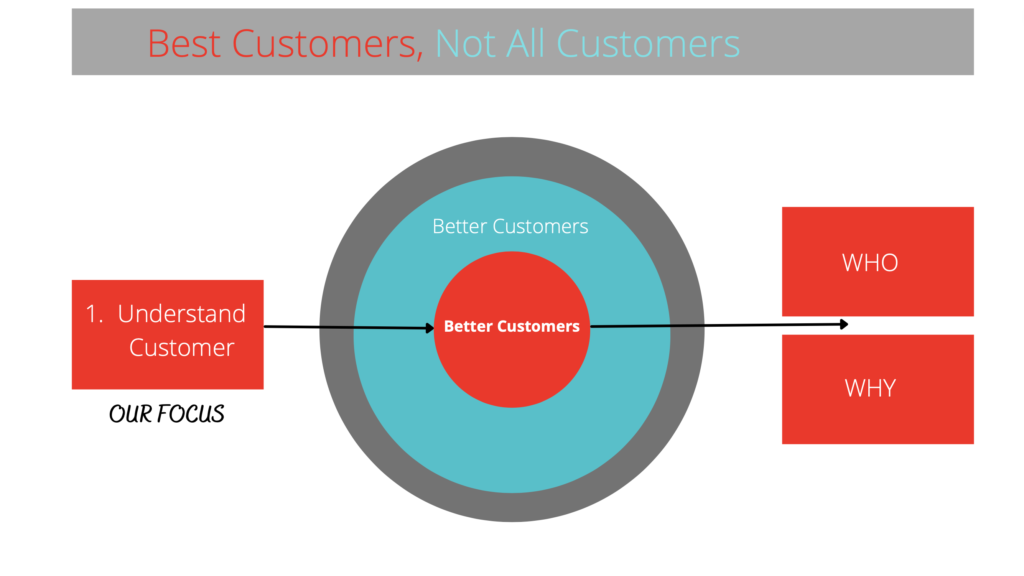
The best customer is defined by a combination of these four criteria:
- Who are the customers that pay the most?
- Who are the customers that stay with you the longest?
- Who are the customers that you love working with?
- Who are the customers that have a high need for the product or service?
We get this info typically by asking the members of the sales team, the marketing team, anyone who is in a customer-facing role.
After we’ve come to a conclusion on who the best customer is that we should target, the next thing that we try to learn is what are their challenges and pain points.
In this part, we try to learn everything we can about these people:
- Why did they buy your product/service?
- What challenges did they have prior to buying?
- What alternative options did they look at prior to purchasing?
- Why did they end up going with your product over the alternatives?
- What part of the product or service do your customers get the most value from?
- What other decision-makers were involved in the buying process?
After we’ve run through the exercise above, and have a good understanding of who the customer is and why the purchase, the final thing we do is search for keywords and other topics that indicate that the customer has intent to buy the product or service.
Want to know our secret sauce of selecting the initial topics based on the keywords with the highest buying intent? Book our calendar!
